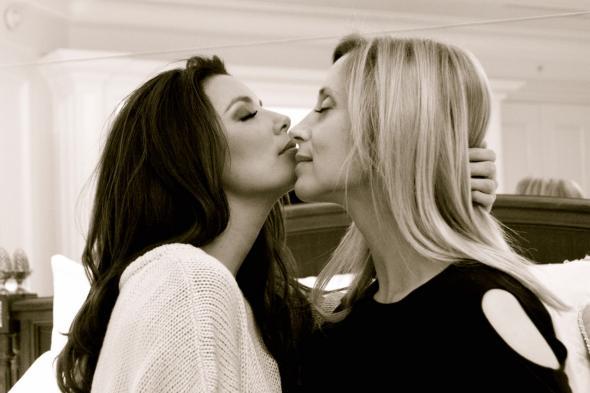In many cases, inquiring after “the point” of something that’s gone viral on the Internet is, well, pointless. But this week we have an item—a staged photo of straight celebrity Eva Longoria (sort of) kissing straight singer Lara Fabian under the banner of fighting homophobia—that’s worth a deeper look. This photo seems to be part of an ongoing trend of, to generalize, person of identity X doing something usually done by identity Y (or at least not usually done by identity X) in order to advance some weak-sauce social justice-y message but really just to grab clicks. And while it’s a stretch to argue that such clicks are “problematic” in any profound way, it’s never a bad idea to scrutinize the assumptions supporting them.
The Longoria photo is part of a series from French photographer Olivier Ciappa called “Imaginary Couples.” The images—which also include one of straight directors Denis Villenueve and Jean-Marc Vallée pretending to have gay sexy times in a shower—have been showing around the world for a while now, but they will have their U.S. debut this summer in Los Angeles. Ciappa told the Huffington Post that the series (which includes real families of various configurations as well as the celebrity fakes) was designed “to show that love is love, no matter who [is involved]”—a laudable, if clichéd, goal. But bromides aside, why do we need straight people playing gay—the clear selling point of the series—to achieve it? What point regarding social acceptance or cross-identity understanding do Longoria and Fabian making out in gayface get across that a real same-sex couple could not?
You might ask a similar question about the “Lesbians Touch Penis for the First Time!” video I blogged about a few weeks ago, or the creators’ other genre entries: “Gay Men Touch Boobs for the First Time!” and “Gay Men Touch Vagina for the First Time!” What is this supremely awkward (bordering on lurid) cross-identity touching meant to accomplish? Likewise for much of the BuzzFeed “Try Guys” sexuality-focused oeuvre, in which the straight dudes do softcore gay things in pursuit of … I’m not sure what, exactly. In-their-shoes experience? Look-we’re-not-homophobic (even while playing off of low-grade “ew, weird!” homophobia) digital cred? It’s hard—and totally not hard because we’re straight, you guys!—to tell.
At one point, I found the Try Guys somewhat endearing; but as this genre of “Postcards from the Other” has expanded beyond them, my response has shifted to confusion and now, with these “Imaginary Couples,” impatience. All these projects draw their goodwill from the notion that they are advancing a progressive ideal of mutual understanding based on the shared humanity beneath our various labels. That, I would be into—it’s a sentiment so bland that one can’t really object. But then, something about the mechanics of these items doesn’t quite bear out that defense. Why do straight actors need to kiss and soap up each other to promote equality? Why do straight BuzzFeed employees need to appraise hot male celebrities or horse around naked to fight homophobia? Why do homosexual men and women need literally to touch the opposite sex’s genitals to understand each other?
It’s a common critique of conservatives that they suffer from a deficit of empathy—they can only be made to see the justice of marriage equality, for example, once their own child comes out. Conservatives take the struggles of marginalized groups seriously once they become personal; progressive folks, on the other hand, are meant to be attuned to injustice across groups, regardless of whether they are personally affected or not.
The success of these items on the lefty Internet challenges that simplistic divide. Clearly, many liberals also feel a need to touch the Other, whether by partaking in a strange sort of identity mimicry or by putting our gloved hand directly between her legs. This is fundamentally a failure of social imagination: A cisgender gay man might not want to touch a vagina in normal circumstances, but then, he doesn’t really need to do that to respect or “understand” (queer) women. Likewise, a straight person can and should support gay love without needing to playact it or be enlightened by actors. A truly progressive society is one in which we readily extend dignity and compassion to those different from us, whether we viscerally “get” them or not. To be sure, a dossier of Web ephemera like this does not signal the impossibility or abandonment of such a goal. But it does make you wonder if a core point of social justice work—a respect for difference rather than the bypassing or erasure of it—is less obvious than we thought.
